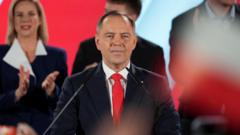Karol Nawrocki has been elected as Poland's new president, winning a narrow majority over liberal mayor Rafal Trzaskowski. Nawrocki's presidency may revitalize Poland's conservative politics, challenging Prime Minister Tusk's pro-EU agenda.
Karol Nawrocki's Surprising Victory in Polish Presidential Election

Karol Nawrocki's Surprising Victory in Polish Presidential Election
A right-wing historian has unseated Warsaw's liberal mayor in a tightly contested race, signaling a shift in Poland's political landscape.
With the final vote tally confirmed, Poland has elected Karol Nawrocki, a right-wing historian, as its new president. The state electoral commission (PKW) reported that Nawrocki secured 50.9% of the votes, surpassing liberal mayor Rafal Trzaskowski, who garnered 49.1%. This represents a dramatic twist from the exit poll released immediately after polls closed, which initially indicated a narrow victory for Trzaskowski, who preliminarily claimed victory then.
At a gathering with his supporters, Trzaskowski remarked on the razor-thin margin, humorously alluding to the political phrase that may become synonymous with this election. "We won, although the phrase 'razor's edge' will forever enter the Polish language and politics," he stated, acknowledging his wife Malgorzata's near panic over the tense results.
Nawrocki remained optimistic after the release of the first exit poll, insisting that the nighttime results would ultimately swing in his favor. "Let's not lose hope for this night. I believe that we will wake up tomorrow with President Karol Nawrocki," he asserted.
Nawrocki's victory is likely to embolden the national conservative Law and Justice (PiS) party, which lost power eighteen months prior, enabling them to mount a significant challenge against Prime Minister Donald Tusk's coalition in the 2027 elections. His presidency is expected to maintain a strong defense of Polish sovereignty within the EU, emphasizing traditional Catholic values and family structures. While he advocates continued support for Ukraine amidst Russia's aggression, he is against its NATO and EU membership.
Although the role of Poland's president is mainly ceremonial with limited impact on foreign policy and defense decisions, the president wields significant veto power over legislation. Tusk’s pro-EU coalition does not have a strong parliamentary majority, thus Nawrocki's veto could halt key reforms aimed at liberalizing laws and limiting political influence on the judiciary.
Current outgoing president, Andrzej Duda, praised Nawrocki's campaign, which he described as a courageous battle for the nation's governance style. Duda, who could not seek re-election after two consecutive terms, emphasized the significance of Nawrocki's election.
While both candidates agree on aiding Ukraine, they diverge in their visions for EU relations. Trzaskowski, a former Europe minister, champions a strong alignment with EU leaders like Germany and France, while Nawrocki advocates for reduced ceding of powers to Brussels and opposes various EU climate and migration policies.
Hailing from a previously lesser-known background, Nawrocki was positioned by the PiS party as a vigorous defender of Polish interests. His campaign included a controversial moment over his private property ownership that raised ethical questions, but he has pledged to donate part of his property portfolio to charity and refuted allegations regarding neglecting a senior citizen in a rental arrangement.
Nawrocki's surprise win marks a pivotal moment in Poland’s electoral landscape, signaling a potential shift toward a more conservative governance aligned with traditional values and a cautious approach to EU integration.


















